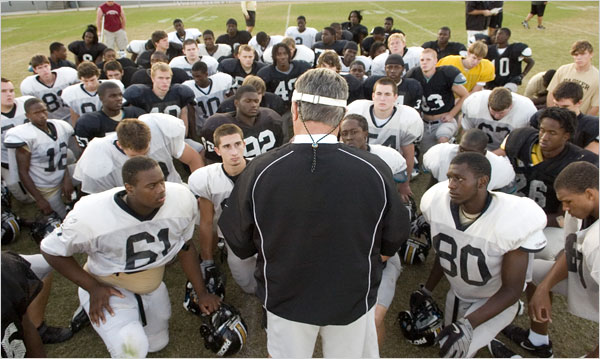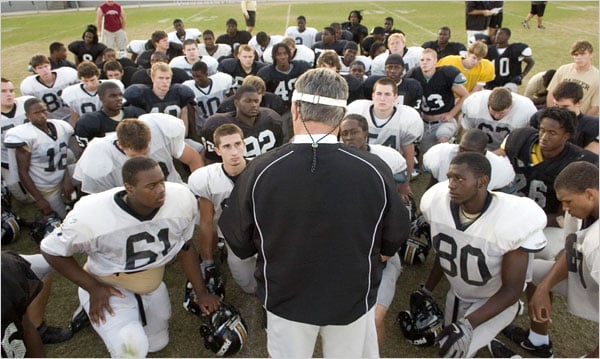
It’s everyone’s favorite time of year again, coaching season! I mean, football, season. All of us, myself included, love the fanfare that surrounds American football: the team rivalries, star players, and team spirit. Many of us, however, forget about the important role that coaches play in making the team what it is when that first game rolls around. We are reminded of their presence when they make poor decision, call a timeout at an inopportune time, or fail to produce wins. Coaches have been, and always will be, the glue that holds the team together, good times and bad. Same can be said of a coach for your business. While you might be doing well, or you may be performing poorly, the coach is always there to assist you in the right direction. Here are the ways sports coaches and business coaches are the same:
Team Spirit: Your attitude towards work, attitude towards co-workers, and attitude towards your boss affect the outcome of your work. A sports coach works on that team spirit to build team connectivity, resulting in better game performance and a cohesive unit, just like a business coach does in the workplace.
Go-get-’em Attitude: When a player is lacking confidence, coaches use practice to make perfect. They use encouraging words and positive reinforcement to hone in those player’s skills. Business coaches do the same thing, and when confidence goes up, so does performance. Just look at any celebrity football player, and you know what I mean. Those touchdown celebrations happen for a reason.
Team Player: If no one on the team gets along well, there’s no way the ball is going to make it from one end of the field to the other. With practices and scrimmages, the team is perfecting its connectivity and allows progress to happen. Business coaches make sure the team gets along, and that everyone is a team player.
In it to Win It: No one is going to play for a team they aren’t engaged in. Football players, and employees, need to have something that they are working for when they are out on the field or in the office. Sports coaches and business coaches help their mentees see what is possible when they connect with their team, and the results are limitless when they do.
Taking one for the Team: We all know the stories about sports coaches yelling at their players when they’ve done wrong, but it is important to remember the multiple instances of positive reinforcement. It is vital that the team member or player is responsive to this feedback, or no progress will be made. For example, if the coach says the player needs to work on a certain play and chooses to ignore it, the results are pretty visible in a game situation. Same can be said for employees. If they aren’t responsive to feedback, progress is stagnant.
Cheering Them On: How well do you think a team would perform in a silent stadium? How would a player continue to excel if they received no feedback on how they are performing? Motivation is a key factor in making sure progress continues. Just think of a time when you were cheered on based on your performance and how that motivated you to continue to be the best you could be. Coaches are there to initially instill that motivation, and after time, that motivation will be intrinsic.
Scrimmage to Game Day: There’s a reason why teams practice before going into game day, and it’s an obvious one, but one that should not be forgotten. No team is perfect at the beginning of a season, and neither is a company. Continual practice and honing in on skills is something that coaches in both respects have to do in order for progress to be made. Look at a team from spring training and then compare their performance during a playoff game. The key difference between the performances is experience and practice, and the coach plays a vital role in working towards that progress.
Locker Room Behavior: Let’s face it, there’s trash talk in the locker room about coach, about the other players, and about the other team. However, the more the team is connected with each other, the less trash talk there is about each other. It is also very important that the coach has a good relationship with the players, or working with each other will prove to be a difficult task. In business coaching, the coach can easily be looked at as an outsider, just like players view their sports coach as separate from the team. It is integral that the coach and teammates view each other as a unit, in order for the outcomes to match intentions.
Practice Off the Field: Sports coaches encourage the teammates to live a healthy lifestyle, practice diligent routines, and to continue to work on things off the field. Intrinsic motivation allows team players to have higher confidence, engagement and progress, both on and off the field. Business coaches also foster that sense of self worth and investment in themselves. In order for employees to succeed, they have to believe in themselves.
Once players and employees have a good foothold of these tenants, they are going to be more easily coached in the future. By practicing these attributes, success and achievement of goals will be a little bit easier.
Having trouble encouraging that intrinsic motivation piece? Attend our next live webinar to learn ways on how to do so. Sign up here!






